Latest
Worship Bass With Steve Gregory: You Never Know the Impact You Will Have
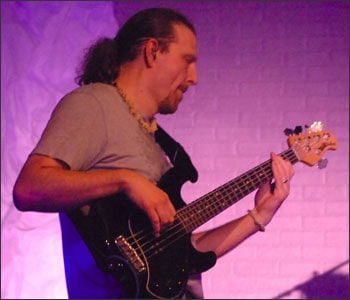
On a recent Sunday a young woman brought her 4 year old son, who has been diagnosed with Attention Deficit Disorder (ADD), to one of our services. During the service, the child was sitting down, standing up, standing on the chair, looking around, wandering several seats away from his mother, picking up a bulletin, talking to everyone around him, etc. This continued while our worship team played, but something odd happened when I played the bass solo section on Hillsong United’s “Salvation Is Here”. To his mom’s amazement, he stood up and stared at the stage, completely focused. As the solo section continued he told his mom, “Look at that guy Mom! The music is running through him! The music running completely through him! That is what I want to do!”
Two things struck me when I heard this story. First, the fact that my playing could affect a 4 year old – and one that suffers from ADD, no less – is astonishing and flattering. I’ve played for some tough crowds before, but I can honestly say that the 3-5 year old market, with their natural tendency to critique things as they see it without a filter, is intimidating. (An adult reviewing my playing: “The use of the Lydian b7 was an “interesting” choice and I’m sure you’re not happy with the cleanliness of that 16th note run”. A 4 year old’s evaluation: “You’re a stupid-head!”…*Ouch*)
My second thought was that while we may not recognize the impact our playing will have, the chance to affect people should shape our attitude toward worship bass. The 4 year old was telling it exactly as he saw it, so we know the impact that was made. What we don’t know is how our playing will influence the person in the service who is depressed. Or the person who is searching. Or the person who is wondering what their friend, who invited them to church, got them into. Or the person who wants to celebrate their relationship with God. Each person in the worship service could have his or her life changed by our playing. When we start to think of the impact we have as worship bassists, the seriousness of our role becomes obvious. I know that a bass player doesn’t “get it” when they tell me about the playing they are doing and add, “oh, and I’ve got a church gig too”. This is the wrong attitude! The church job is truly important and is difficult to do well! (And a church gig for 3-5 year old kids? Whoa…)
In order to break down this responsibility into manageable pieces, I’ve created a list below of “be’s” for the worship bassist. Before presenting the list, I do want to say that I’m writing these not from a “holier than thou” position; rather, I came up with these as things that I personally need to do consistently.
• Be present. This can be tough, but worship bassists have to leave the static of life at the door. When you are playing, nothing but the worship experience matters. I know that I’ve had to stop for a few moments and let bad traffic, monthly bills, spilt coffee, and other life irritants fall to the background before going on stage. Carry your bass on your shoulder, but don’t let life’s worries rest there too.
• Be passionate. Playing worship bass is all about passion! If you are willing to be present, then you can pour everything into the service. I personally make it a goal to have nothing left when I leave the stage. Why hold anything back? I challenge you to try it during your next worship set – if you need a nap afterwards, that’s a good sign!
• Be a humble servant. Being humble can be difficult to balance with presence and passion. As I talked about in my last article, worship bass is all about supporting the worship environment. Sometimes that flashy lick is truly cool, but doesn’t support the worship environment. You may think you are “feeling it”, but you have to remember: it’s not about you! Pour your passion into the worship, not into promoting yourself.
• Be prepared. This is critical! The fact of the matter is that being under prepared is a sure way to deflate the worship experience. Those in the congregation absolutely can and will sense when the bassist is not prepared. Listen to the music, learn the music, and practice the music – ahead of time!
• Be willing to work on your skills. Yep, I’m echoing every bass teacher you’ve ever had: practice! You have to keep your skills sharp in order to bring your best to the worship experience. There are great ways to focus practice time to fit into 30 minute or one hour blocks, so marathon sessions aren’t necessary. As far as practice material, make sure that you use your time for technique, theory, transcription, and other items that aren’t categorized as “stuff you already know”. For even more specific material, look no further than this magazine – I personally devour every issue to learn as much as I can from this amazing staff!
• Be serious, but not too serious. I’ve spent about 1000 words painting the seriousness of being a worship bassist and indeed, it is an important job. Having said that, you can’t let a sense of responsibility creep into becoming a state of obsessive, over analytical, stressful, non-feeling mechanics. For example: I was playing a song that opens with a bar of sixteenth notes, followed by a bar that contains a sixteen note rest, followed by sixteen notes for the remaining space. Somewhere in that run, my plucking hand decided it didn’t want to play one of the sixteenth notes in the second measure. The flub was shocking and embarrassing – I had played simple patterns like this a million times and my ears heard the mistake loud and clear. My natural tendency would be to stew over this for the rest of the song and perhaps for the rest of the service. When I looked out at the crowd though, hands were raised, people were singing, and they didn’t notice or care about the sixteenth note that meant so much to me. Don’t let the call to seriousness pull you away from your mission: to create the worship environment.
Being a worship bassist is a rewarding but challenging job. It’s easily one of the most amazing gigs out there because you can make a lifelong impact. How do I know? I heard about this guy (who may or may not be the writer of this article) who was establishing himself as a bass player, but was being bumped around in life and was searching for something. The girl he was dating took him to a church where the bass player obviously took his job seriously, because the playing that day led to a life changing turn to God and a dedication to playing worship music… (Thank goodness Dave Combs was a worship bassist who “got it”.)
Until next time, I hope that your bass playing is blessed and that you can bless others through your bass playing!
Bass CDs
New Album: Jake Leckie, Planter of Seeds
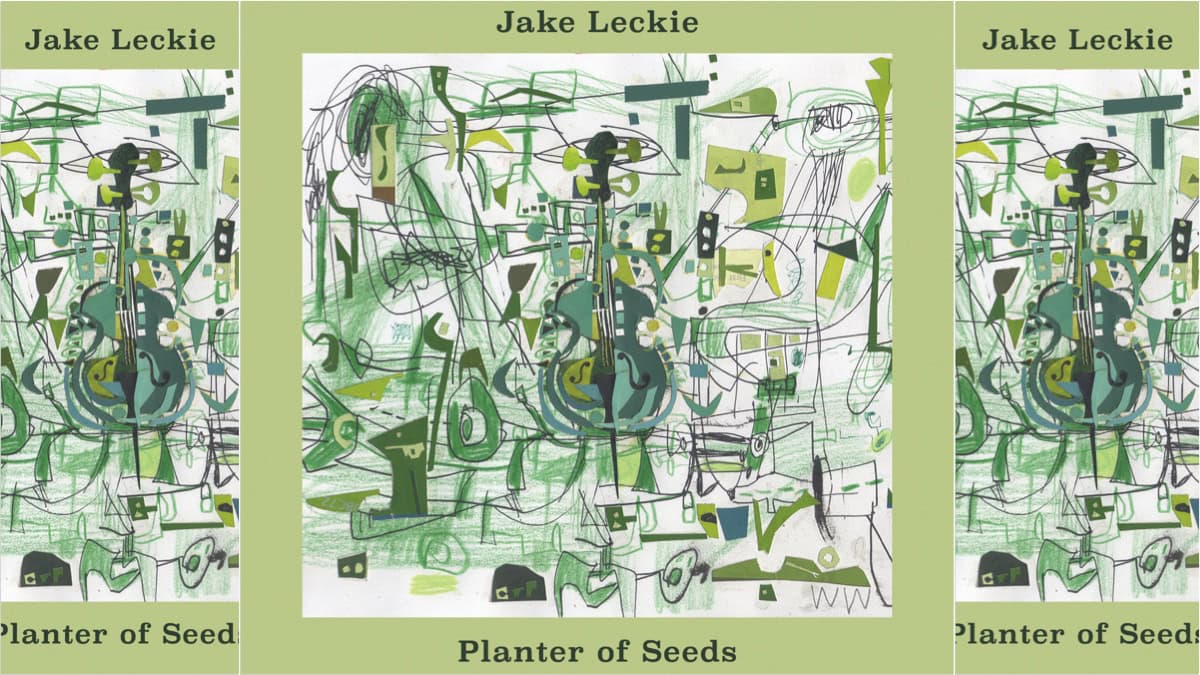
Bassist Jake Leckie and The Guide Trio Unveil New Album Planter of Seeds,
to be released on June 7, 2024
Planter of Seeds is bassist/composer Jake Leckie’s third release as a bandleader and explores what beauty can come tomorrow from the seeds we plant today.
What are we putting in the ground? What are we building? What is the village we want to bring our children up in? At the core of the ensemble is The Guide Trio, his working band with guitarist Nadav Peled and drummer Beth Goodfellow, who played on Leckie’s second album, The Guide, a rootsy funky acoustic analog folk-jazz recording released on Ropeadope records in 2022. For Planter of Seeds, the ensemble is augmented by Cathlene Pineda (piano), Randal Fisher (tenor saxophone), and Darius Christian (trombone), who infuse freedom and soul into the already tightly established ensemble.
Eight original compositions were pristinely recorded live off the floor of Studio 3 at East West Studios in Hollywood CA, and mastered by A.T. Michael MacDonald. The cover art is by internationally acclaimed visual artist Wayne White. Whereas his previous work has been compared to Charles Mingus, and Keith Jarrett’s American Quartet with Charlie Haden, Leckie’s new collection sits comfortably between the funky odd time signatures of the Dave Holland Quintet and the modern folk-jazz of the Brian Blade Fellowship Band with a respectful nod towards the late 1950s classic recordings of Ahmad Jamal and Miles Davis.
The title track, “Planter of Seeds,” is dedicated to a close family friend, who was originally from Trinidad, and whenever she visited family or friends at their homes, without anyone knowing, she would plant seeds she kept in her pocket in their gardens, so the next season beautiful flowers would pop up. It was a small altruistic anonymous act of kindness that brought just a little more beauty into the world. The rhythm is a tribute to Ahmad Jamal, who we also lost around the same time, and whose theme song Poinciana is about a tree from the Caribbean.
“Big Sur Jade” was written on a trip Leckie took with his wife to Big Sur, CA, and is a celebration of his family and community. This swinging 5/4 blues opens with an unaccompanied bass solo, and gives an opportunity for each of the musicians to share their improvisational voices. “Clear Skies” is a cathartic up-tempo release of collective creative energies in fiery improvisational freedom. “The Aquatic Uncle” features Randal Fisher’s saxophone and is named after an Italo Calvino short story which contemplates if one can embrace the new ways while being in tune with tradition. In ancient times, before a rudder, the Starboard side of the ship was where it was steered from with a steering oar. In this meditative quartet performance, the bass is like the steering oar of the ensemble: it can control the direction of the music, and when things begin to unravel or become unhinged, a simple pedal note keeps everything grounded.
The two trio tunes on the album are proof that the establishment of his consistent working band The Guide Trio has been a fruitful collaboration. “Santa Teresa”, a bouncy samba-blues in ? time, embodies the winding streets and stairways of the bohemian neighborhood in Rio de Janeiro it is named for. The swampy drum feel on “String Song” pays homage to Levon Helm of The Band, a group where you can’t always tell who wrote the song or who the bandleader is, proving that the sum is greater than the individual parts. Early jazz reflected egalitarianism in collective improvisation, and this group dynamic is an expression of that kind of inclusivity and democracy.
“The Daughters of the Moon” rounds out the album, putting book ends on the naturalist themes. This composition is named after magical surrealist Italo Calvino’s short story about consumerism, in which a mythical modern society that values only buying shiny new things throws away the moon like it is a piece of garbage and the daughters of the moon save it and resurrect it. It’s an eco-feminist take on how women are going to save the world. Pineda’s piano outro is a hauntingly beautiful lunar voyage, blinding us with love. Leckie dedicates this song to his daughter: “My hope is that my daughter becomes a daughter of the moon, helping to make the world a more beautiful and verdant place to live.”
Bass CDs
Debut Album: Nate Sabat, Bass Fiddler
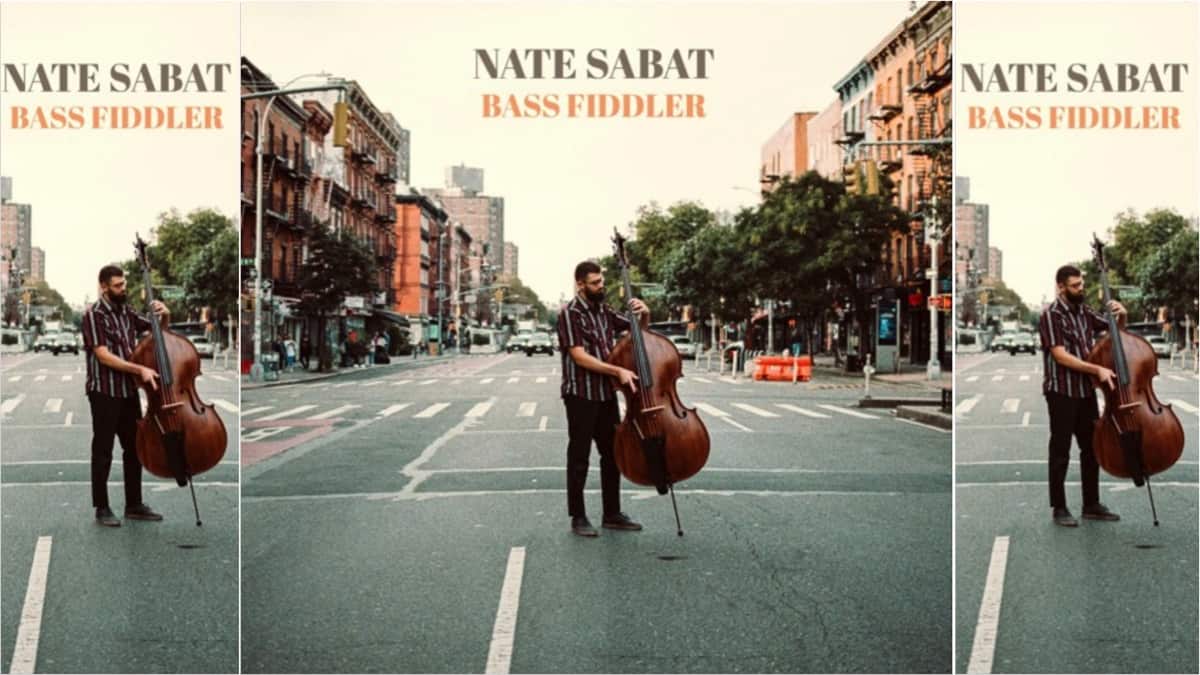
In a thrilling solo debut, bassist Nate Sabat combines instrumental virtuosity with a songwriter’s heart on Bass Fiddler…
The upright bass and the human voice. Two essential musical instruments, one with roots in 15th century Europe, the other as old as humanity itself.
On Bass Fiddler (Adhyâropa Records ÂR00057), the debut album from Brooklyn-based singer-songwriter and bass virtuoso Nate Sabat, the scope is narrowed down a bit. Drawing from the rich and thriving tradition of American folk music, Sabat delivers expertly crafted original songs and choice covers with the upright bass as his lone tool for accompaniment.
The concept was born a decade ago when Sabat began studying with the legendary old-time fiddler Bruce Molsky at Berklee College of Music. “One of Bruce’s specialties is singing and playing fiddle at the same time. The second I heard it I was hooked,” recalls Sabat. “I thought, how can I do this on the bass?” From there, he was off to the races, arranging original and traditional material with Molsky as his guide. “Fast forward to 2020, and I — like so many other musicians — was thinking of how to best spend my time. I sat down with the goal of writing some new songs and arranging some new covers, and an entire record came out.” When the time came to make the album, it was evident that Molsky would be the ideal producer. Sabat asked him if he’d be interested, and luckily he was. “What an inspiration to work with an artist like Nate,” says Molsky. “Right at the beginning, he came to this project with a strong, personal and unique vision. Plus he had the guts to try for a complete and compelling cycle of music with nothing but a bass and a voice. You’ll hear right away that it’s engaging, sometimes serious, sometimes fun, and beautifully thought out from top to bottom.”
While this record is, at its core, a folk music album, Sabat uses the term broadly. Some tracks lean more rock (‘In the Shade’), some more pop (‘White Marble’, ‘Rabid Thoughts’), some more jazz (‘Fade Away’), but the setting ties them all together. “There’s something inherently folksy about a musician singing songs with their instrument, no matter the influences behind the compositions themselves,” Sabat notes. To be sure, there are plenty of folk songs (‘Louise’ ‘Sometimes’, ‘Eli’) and fiddling (‘Year of the Ox’) to be had here — the folk music fan won’t go hungry. There’s a healthy dose of bluegrass too (‘Orphan Annie’, ‘Lonesome Night’), clean and simple, the way Mr. Bill Monroe intended.
All in all, this album shines a light on an instrument that often goes overlooked in the folk music world, enveloping the listener in its myriad sounds, textures, and colors. “There’s nothing I love more than playing the upright bass,” exclaims Sabat. “My hope is that listeners take the time to sit with this album front to back — I want them to take in the full scope of the work. I have a feeling they’ll hear something they haven’t heard before.”
Available online at natesabat.bandcamp.com/album/walking-away
Gear News
New Gear: Esopus Guitars Launches New Acoustic/Electric Bass
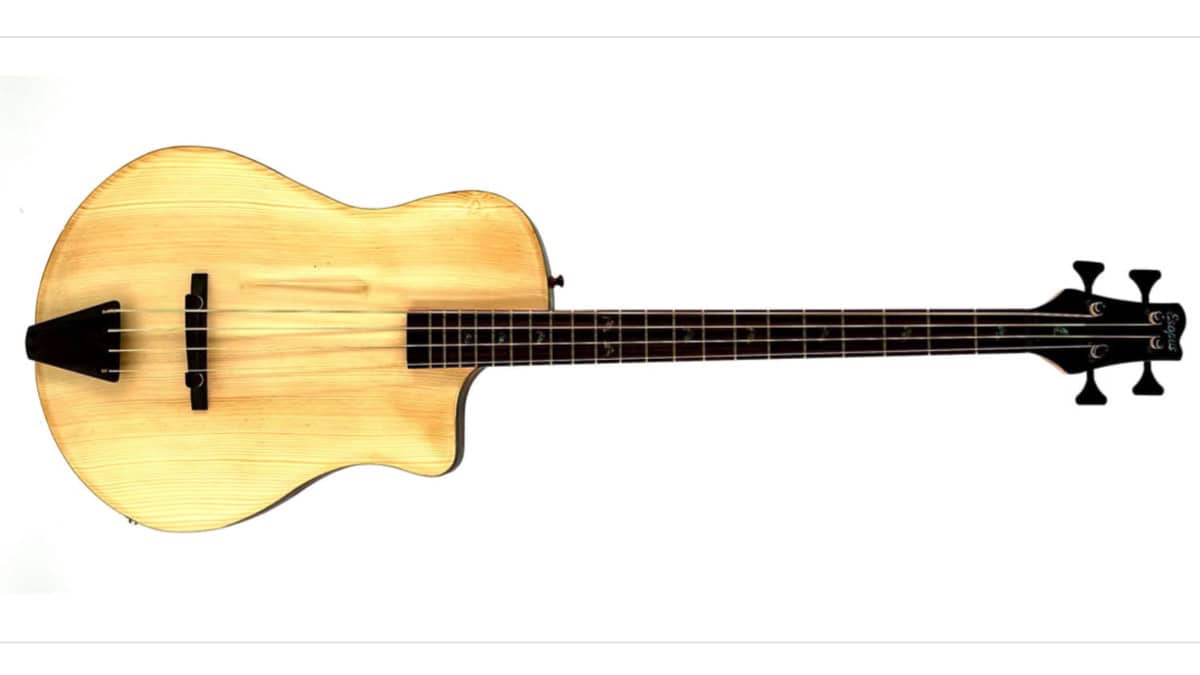
Esopus Guitars Launches New Acoustic/Electric Bass…
Esopus Guitars is proud to announce the new “Tailwater” bass guitar, from legendary bass luthier Stuart Spector. This 32” scale bass is handcrafted by Stuart using the only finest woods and components at the Esopus Guitar workshop located near Woodstock NY in the Catskill Mountains.
From its fully carved spruce top (the top is carved on both its exterior and interior surfaces) with a thumb rest that is elegantly carved into the top, to its custom-made Fishman piezo pickup and super hard Carnauba wax finish, every detail of the Tailwater is part of creating the ultimate playing experience.
The Tailwater bass features a fully chambered spruce over alder body (15.5″ lower body bout width, 2.25″ body thickness measuring from the peak of the carved top) that delivers a super comfortable tonal tool for all your low-end needs.
Each Tailwater bass is hand-signed and numbered on the back of the peghead by Stuart Spector. A very limited number of Tailwater basses are handcrafted each year at the Esopus workshop.
“I am proud to present the Tailwater bass, a bass that I have spent the last three years perfecting. The Tailwater is a culmination of all of my 45 years of experience, knowledge, and passion for bass guitar crafting. I am so eager to hear what fellow musicians create with this exciting new instrument.” -Stuart Spector
Direct Pricing : $4995.00 plus options.
For more information about Esopus Guitars and Stuart Spector’s handcrafted instruments, visit www.EsopusGuitars.com.
Bass Videos
Tour Touch Base (Bass) with Ian Allison

Ian Allison Bassist extreme…
Most recently Ian has spent the last seven years touring nationally as part of Eric Hutchinson and The Believers, sharing stages with acts like Kelly Clarkson, Pentatonix, Rachel Platten, Matt Nathanson, Phillip Phillips, and Cory Wong playing venues such as Radio City Music Hall, The Staples Center and The Xcel Center in St. Paul, MN.
I had a chance to meet up with him at the Sellersville Theater in Eastern Pennsylvania to catch up on everything bass. Visit online at ianmartinallison.com/
Latest
This Week’s Top 10 Basses on Instagram
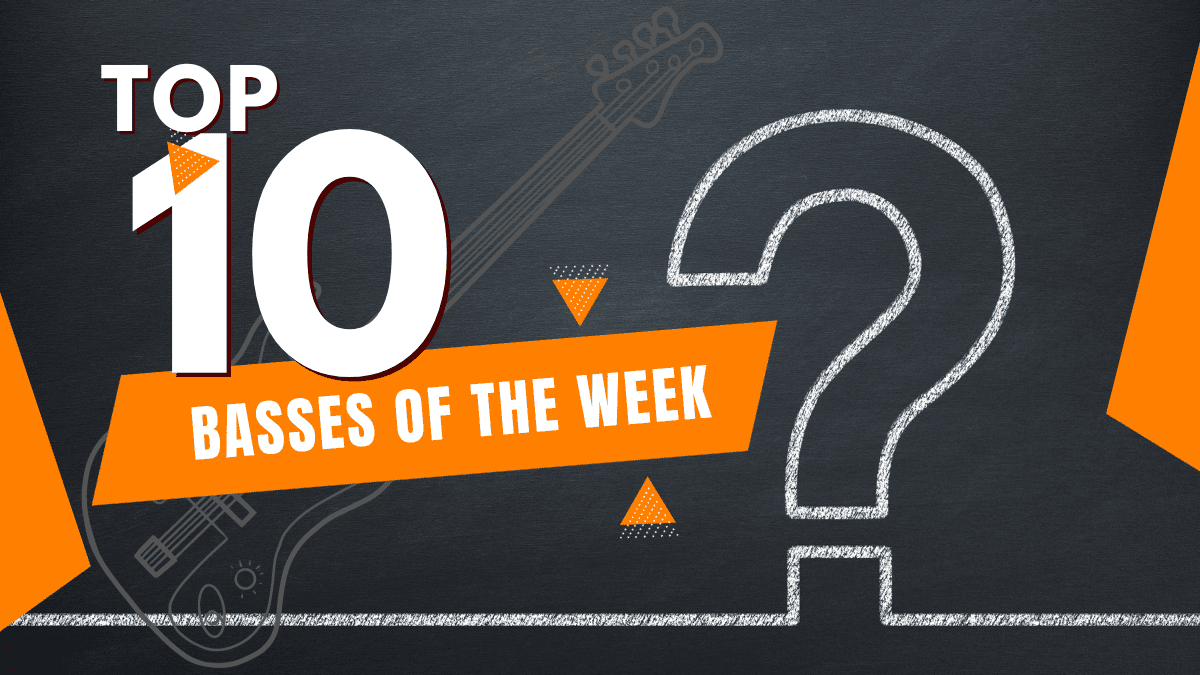
Check out our top 10 favorite basses on Instagram this week…
Click to follow Bass Musician on Instagram @bassmusicianmag
FEATURED @officialspector @bqwbassguitar @brute_bass_guitars @phdbassguitars @ramabass.ok @tribe_guitars @woodguerilla_instruments @mikelullcustomguitars @jcrluthier @elegeecustom





















